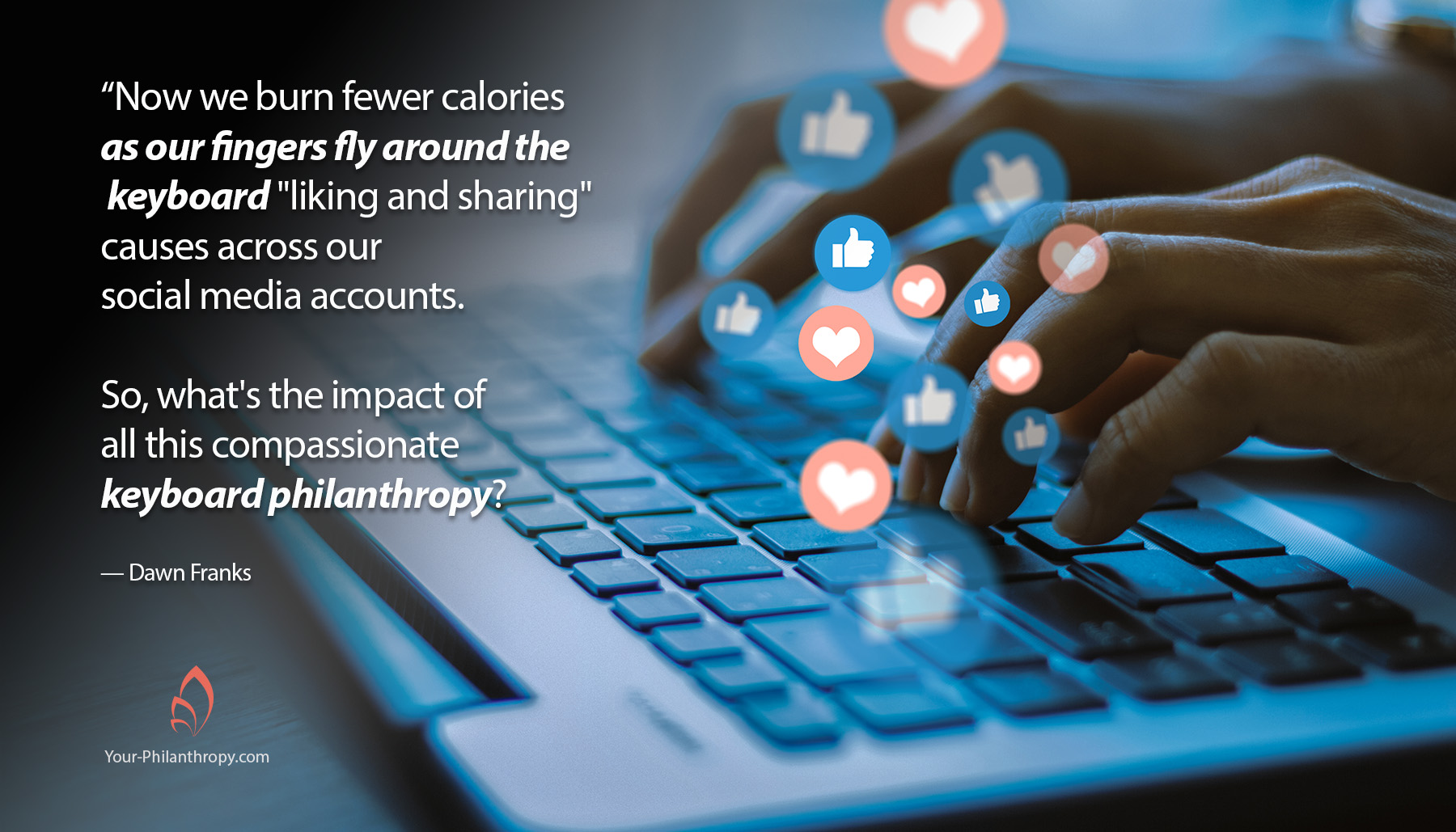Not too long ago, just a decade or so, action required considerable movement by using large muscle groups like glutes, quads, and hamstrings; we got out of the recliner and off the couch. Action burned calories; it was substantial, even consequential.
Now we burn fewer calories as our fingers fly around the keyboard “liking and sharing” causes across our social media accounts. So, what’s the impact of all this compassionate keyboard philanthropy? A plea for help, an outcry that needs to be shared, a cause supported, and messages sent worldwide.
Sadly, a 2013 study by the University of British Columbia’s Sauder School of Business reported that for many of us, liking a cause was all the action needed to scratch the compassion itch. Like and share buttons relieved the need for personal action. So, we opt out of any commitment of time and money, but it satisfies the desire to look good to others.
The study also suggested that when social media motivated us to make private or less public-facing commitments to a cause, we took that responsibility seriously. So, now the decision to sign a petition or donate has become personal, and many of us stop to be sure the decision aligns with our values, which I call Giving Fingerprints.
At the time of the University of B.C. study in 2013, there were 699 million Facebook users. Today, over 3.5 billion monthly users spend time connecting, liking, and sharing. Nonprofits everywhere wish that such an increase in users, an 81% increase, would translate to 81% more donations. It’s just not so.
Going Beyond Liking and Sharing
What about your opinions and feedback? You are a well-meaning supporter with helpful feedback for the leaders of a cause or a nonprofit you support. And Facebook seems like an easy place to share your thoughts. Will the nonprofit see your post? Will a board member know you shared a great idea?
Unfortunately, it isn’t likely your Facebook opinions will change the actions of a nonprofit or impact the direction of a cause. Remember, Facebook’s goal is to make money, and its algorithms have that goal in mind. So, while Facebook is all about you and me, it’s not really about us at all.
Even though we recognize we’re just targets with a dollar sign on our chest, we still post. Why? Because two forces drive online sharing – status and emotion. Does it make me look good – smarter, most informed, or first to know? Does it push my buttons — trigger deep-seated emotions or a tip of the tongue thrashing or even verbal applause? So, here’s a suggestion to make Facebook count.
Make Your Feedback Matter
If you want your feedback to matter, try out this phrase, “I’m sharing these comments because I have very high expectations of the organization, and I know your work matters.”
A contributing editor to Inc. Magazine, Jeff Haden says a similar phrase, “I’m sharing these comments because I have very high expectations and I know you can reach them,” receives a 40 percent bump in positive reactions from an employee.
That’s it. Simple and direct. I have high expectations, and you can reach them. If we could research the impact of my version, I believe the impact would be 60 percent or higher when a nonprofit learns about the post.
Believing in people matters; believing in organizations multiplies the impact.
But don’t stop with Facebook. If the feedback you want to deliver is important enough to drive you to post on Facebook, you should also grab your phone and make a call to the organization, a board member, or an active volunteer.
I spend a lot of time in conversation with people of all stripes. Donors, nonprofits, business owners, leaders – I’ve sat and listened as they talked about their challenges, disappointments, and failures. I’ve also heard their successes, lessons learned, hopes and dreams. They almost all have common questions.
Can they meet the high expectations others have of them? Does anyone believe in their ability to get there? Are their dreams possible?
Take your feedback offline and follow Jeff Hayden’s suggestion, “Don’t soft-pedal high standards: Don’t pretend that it’s easy – do the opposite. Emphasize the toughness of the task and your belief that they have what it takes.”
Facebook can be a useful, even fun tool for communication, but as donors and supporters of a cause, we must go beyond. It requires us to act through compassionate philanthropy—giving aid, assisting, helping on the ground where needed. It requires questions that challenge the work, suggestions that offer new directions with high expectations and the belief that we all matter.
Like it. Use it. Share it. Comment below.


0 Comments